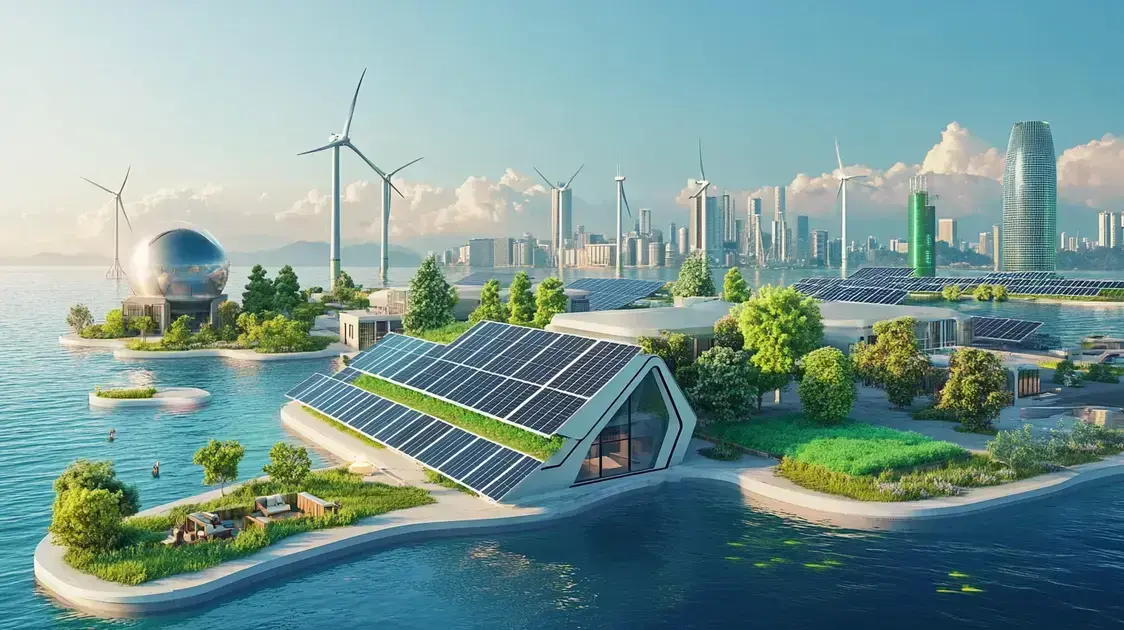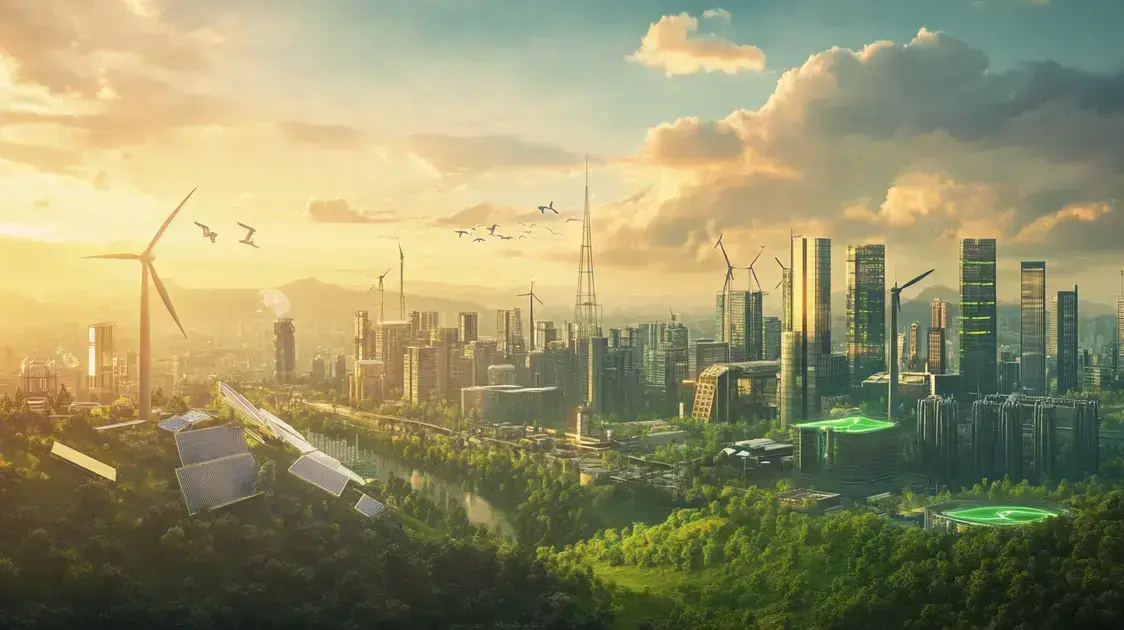Sustainable Energy Innovations are crucial for building a cleaner and more efficient future. As the world shifts away from fossil fuels, investing in renewable solutions is essential. These technologies help reduce carbon emissions, increase energy efficiency, and promote long-term sustainability.
The impact of Sustainable Energy Innovations extends across industries, from transportation to manufacturing. Advancements in solar, wind, and energy storage are making clean power more accessible. Governments and businesses are increasingly prioritizing these solutions to meet global energy demands responsibly.
Exploring the latest Sustainable Energy Innovations is key to understanding how they shape our future. Discover how these technologies are transforming industries and how you can be part of the transition to a more sustainable world. Keep reading to learn more.
Understanding Sustainable Energy Innovations
Understanding sustainable energy innovations is key as the world transitions to cleaner power sources. These advancements reduce carbon emissions, improve efficiency, and utilize renewables like solar and wind. As technology advances, these solutions are becoming more accessible and cost-effective.
Smart grids, battery storage, and AI-driven systems are transforming energy use. They enhance reliability, optimize distribution, and reduce reliance on fossil fuels. Businesses and households benefit from more sustainable and affordable energy options.
Adopting sustainable energy innovations is vital for a greener future. Learning about these technologies helps individuals and businesses make informed energy choices. Keep reading to explore the latest trends and their global impact.
The Role of Technology in Sustainable Energy
The role of technology in sustainable energy is pivotal for driving the transition to renewable resources. Technology enables the efficient capture, storage, and distribution of energy from sustainable sources like solar, wind, and hydro. Each advancement in this field helps us harness nature’s power more effectively.
Innovative Energy Solutions
Technological innovations, such as advanced solar panels, play a crucial role in energy production. These panels are designed to absorb more sunlight, converting it to electricity at higher efficiency rates. Similarly, wind turbines have become more effective, utilizing better materials and designs to capture energy from winds.
Smart Grids and Energy Management
The advent of smart grid technology has transformed how we manage energy resources. Smart grids allow for real-time monitoring and management of energy supply and demand. This enables a more reliable energy distribution system, minimising waste and ensuring that renewable sources are fully utilized.
Energy Storage Technologies
Energy storage systems are essential for maintaining energy supply when the generation is inconsistent, as seen with solar and wind power. Technologies like lithium-ion batteries have made it possible to store excess energy for use during peak demand. Furthermore, developing new storage solutions, such as solid-state batteries, continues to improve energy reliability.
Data Analytics in Energy Use
Data analytics is a powerful tool that drives efficiency in energy consumption. By analysing consumption patterns, technology helps organisations and consumers understand their energy use and identify areas for improvement. This can lead to more informed decisions, ultimately reducing energy consumption and costs.
Reducing Carbon Footprint
Innovative technologies not only enhance energy efficiency but also contribute to reducing carbon emissions. Electric vehicles (EVs) and their supporting infrastructure, such as charging stations, are examples of how technology reduces reliance on fossil fuels and promotes cleaner energy alternatives.
The Future of Technology in Sustainable Energy
The future of technology in sustainable energy looks promising. Ongoing research aims to develop even more efficient energy solutions that can seamlessly integrate with our existing infrastructure. This continued innovation is essential for achieving global energy goals and combating climate change.
Top Sustainable Energy Innovations of 2025

Sustainable Energy Innovations are advancing rapidly, improving efficiency and accessibility. In 2025, next-generation solar panels, enhanced wind turbines, and better energy storage solutions are leading the shift to cleaner power. These advancements lower costs and make renewable energy more reliable.
Hydrogen energy is emerging as a key solution, offering a clean alternative to fossil fuels. Innovations in production and storage are making it more practical for industries and transportation. AI-driven energy management systems and smart grids are also optimizing renewable energy distribution.
These Sustainable Energy Innovations are transforming the global energy landscape. As investments grow, businesses and households will increasingly adopt sustainable solutions. Understanding these changes is crucial for embracing a greener future.
Benefits of Sustainable Energy Innovations
Benefits of sustainable energy innovations are numerous and essential for our planet’s future. These innovations help in reducing environmental impact, promoting economic growth, and providing cleaner energy alternatives.
1. Reduced Carbon Emissions
Sustainable energy innovations significantly lower carbon emissions compared to fossil fuels. Using renewable sources, like solar and wind, means less air pollution and a healthier planet.
2. Energy Independence
By investing in sustainable energy, countries can reduce their reliance on imported fuels. This independence enhances energy security and stabilises energy prices.
3. Job Creation
The shift towards sustainable energy innovations creates new jobs in industries such as solar, wind, and energy efficiency. This transition helps support local economies and fosters workforce development.
4. Long-Term Cost Savings
While the initial investment might be high, sustainable energy technologies often lead to long-term savings. Renewable energy sources can reduce electricity bills and maintenance costs.
5. Enhanced Public Health
By cutting down on pollution, sustainable energy innovations contribute to better public health. Cleaner air and water quality can lead to fewer health problems and lower healthcare costs.
6. Technological Advancements
Investing in sustainable energy encourages research and development. This results in technological advancements that can improve efficiency, storage, and functionality, benefitting various sectors.
7. Global Collaboration
The push for sustainable energy fosters international partnerships. Countries work together to share knowledge, resources, and technologies, promoting global sustainability efforts.
Challenges in Implementing Sustainable Energy
Challenges in implementing sustainable energy are significant barriers that need to be addressed for a greener future. These challenges include financial, technical, and social aspects that can impede progress.
1. High Initial Costs
One of the biggest challenges is the high upfront cost associated with sustainable energy technologies. Although long-term savings are evident, the initial investment can deter potential adopters.
2. Infrastructure Limitations
Many regions lack the necessary infrastructure to support renewable energy systems. Upgrading power grids and transmission systems is costly and time-consuming, creating hurdles for implementation.
3. Technological Complexity
The complexity of new technologies can be overwhelming. Some businesses and consumers may struggle to understand how to implement and operate sustainable energy systems effectively, hindering their adoption.
4. Policy and Regulatory Barriers
Government policies and regulations can be restrictive. In some areas, there may be insufficient support for sustainable energy initiatives, making it difficult for projects to move forward.
5. Public Awareness and Acceptance
Lack of public awareness about the benefits of sustainable energy can also pose challenges. Without education and outreach, communities may resist the transition to renewable sources.
6. Competition with Fossil Fuels
Fossil fuels continue to dominate the energy market due to established infrastructure and lower prices. This competition can make it challenging for renewable energy sources to gain traction.
7. Resource Variability
Many renewable energy sources, such as solar and wind, are dependent on weather conditions. Variability in energy generation can create challenges for reliability and planning.
Future Trends in Sustainable Energy

Future trends in sustainable energy are aimed at revolutionising how we think about and use energy resources. These trends focus on enhancing efficiency, integrating new technologies, and addressing climate change challenges.
1. Increased Adoption of Smart Grids
Smart grid technology is expected to expand significantly. These systems will help manage energy distribution more effectively, integrating various renewable energy sources to provide reliable electricity.
2. Decentralisation of Energy Production
Decentralised energy systems will continue to grow, allowing individuals and communities to generate their own energy. This trend promotes energy independence and increases resilience against grid failures.
3. Rise in Energy Storage Solutions
As renewable energy sources become more prevalent, the demand for advanced energy storage solutions will soar. Technologies such as lithium-sulfur batteries and grid-scale storage will help store energy for when it is needed most.
4. Expansion of Electric Vehicles (EVs)
The electric vehicle market will see rapid growth, with more models available and greater charging infrastructure. EVs play a critical role in reducing emissions and increasing the use of renewable energy.
5. Green Hydrogen Utilisation
Green hydrogen will become a key player in the energy transition. It can replace fossil fuels in various applications, such as heavy transport and industrial processes, thus reducing greenhouse gas emissions.
6. Focus on Energy Efficiency Technologies
Innovations in energy efficiency will help reduce overall energy consumption. Technologies like smart appliances and energy-efficient building materials will become standard in homes and businesses.
7. Enhanced Policy Support for Renewables
Governments will likely implement more supportive policies for renewable energy development. This includes incentives for adopting green technologies and setting ambitious emissions reduction targets.
How to Support Sustainable Energy Innovations
How to support sustainable energy innovations is essential for fostering a greener future. Individuals, businesses, and governments can all play a role in promoting sustainable practices.
1. Educate Yourself and Others
Stay informed about sustainable energy technologies and their benefits. Share knowledge with your community to inspire others to consider renewable energy solutions.
2. Invest in Renewable Energy
Consider investing in renewable energy projects, such as solar panels or wind turbines. Homeowners can also invest in community solar programs to support local renewable initiatives.
3. Advocate for Supportive Policies
Engage with policymakers to encourage the implementation of policies that promote sustainable energy. Advocate for incentives that support clean energy projects and reduce barriers to adoption.
4. Use Energy-Efficient Products
Make choices that prioritise energy efficiency. Opt for energy-rated appliances, LED lighting, and smart home technologies to reduce energy consumption.
5. Participate in Local Initiatives
Join local sustainability groups or participate in community clean-up events. Many communities have programmes aimed at promoting renewable energy and reducing emissions.
6. Support Companies Committed to Sustainability
Buy products and services from businesses that prioritise sustainable practices. Supporting companies that invest in renewable energy helps drive demand for clean solutions.
7. Reduce, Reuse, and Recycle
Incorporate sustainable habits into your daily life. Reducing waste, reusing items, and recycling materials can help lessen the overall environmental impact.
FAQ – Frequently Asked Questions about Sustainable Energy Innovations
What are sustainable energy innovations?
Sustainable energy innovations refer to new technologies and practices that promote the use of renewable energy sources, reduce carbon emissions, and enhance energy efficiency.
How can I support sustainable energy initiatives?
You can support sustainable energy by educating yourself and others, investing in renewable energy, advocating for supportive policies, using energy-efficient products, and participating in local sustainability initiatives.
What are the benefits of sustainable energy innovations?
Benefits include reduced carbon emissions, energy independence, job creation, long-term cost savings, enhanced public health, and promoting global collaboration.
What challenges do we face in implementing sustainable energy?
Challenges include high initial costs, infrastructure limitations, regulatory barriers, public awareness, competition from fossil fuels, and resource variability.
What future trends can we expect in sustainable energy?
Future trends include the increased adoption of smart grids, decentralisation of energy production, advancements in energy storage solutions, the rise of electric vehicles, and greater policy support for renewables.
How does technology play a role in sustainable energy?
Technology enhances the efficiency and effectiveness of renewable energy sources, from advanced solar panels to smart grid systems that optimise energy distribution.
